As part of the operational program “Public Sector Reform” – “Actions for the Development of Knowledge and Skills for the Personnel of the Ministry of National Defense,” five-day seminars were held in four cities in Greece – Athens, Thessaloniki, Volos, and Chania – by the SCHOOL OF TELECOMS, on the educational program “FIBER OPTICS – WELDING – MEASUREMENTS.”
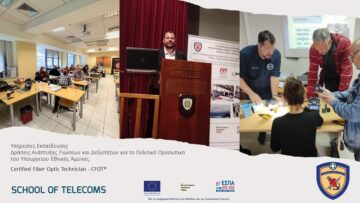
The entire program of the Ministry of National Defense was supported by other institutions – ACTA AE, ΙΒΕΠΕ-ΣΕΒ, INTERACTIVE/OE KDBM2, ELINYAE, SCHOOLS DELTA ATHENS, and PASS DEFENSE ΜΕΠΕ – who contributed their expertise in their respective fields. Funding was provided through the NSRF program.
The program lasted for several months and focused on the development and enhancement of the knowledge and skills of the participants in the field of optical fibers, offering significant benefits to all. The fiber optic training targeted permanent technical/technological personnel of the Ministry of National Defense and a total of 75 colleagues participated, who took part in the CFOT® – Certified Fiber Optic Technician certification exams of the global organization F.O.A.
The purpose of the program was for the trainees to understand the basic principles and concepts of how an optical fiber network operates, to comprehend the communication methods of optical systems, to be able to process different types of optical cables that may be deployed in an application correctly and safely, to measure losses in an optical fiber cable, and finally, to become familiar with the termination and splicing of optical cables where necessary.
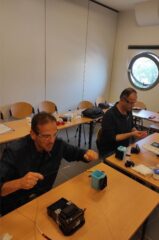
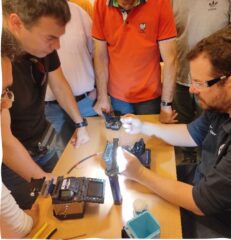
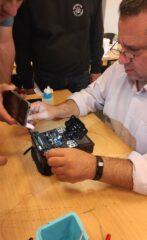
Education has always been a vital factor for the successful operation and continuous growth of an organization. The numerous benefits derived from education range from increased efficiency and productivity to the development of critical skills and the enhancement of teamwork, providing technical personnel with the tools needed to meet ongoing challenges.
Upon completion of the fiber optic training, the main findings resulting from the analysis of the collected data, concerning both the trainees and the trainers, are as follows:
- A very high participation rate of women with high performance for such a technical seminar (90% male participants, 10% female participants).
In this particular educational program, we managed to exceed all expectations, achieving a remarkably high participation rate without any signs of inequality or discrimination.
- 120 hours of basic training in the field of optical fibers. Especially in the field of optical fibers, there are constantly changing dynamics, and it is essential to stay updated on them. Therefore, in some cases, beyond basic studies, further improvement of knowledge and skills is required to secure a job position. The need for lifelong learning is evident, and investing time in relevant programs is necessary.
- The trainees focused on the benefits they gained at a technical level. Specifically, through their participation, the trainees expanded their technological horizons beyond their own specialization, leveraging their prior knowledge as a tool to assimilate fiber optics technology.
- Active participation from the trainees – A total of 60 quiz questions were conducted, while over 600 questions and exercises were answered and interpreted.
- Practical exercise – 55 hours of hands-on workshop (Splicing, OLTS, OTDR). The aim was to lead the trainees into action, followed by an analysis of the results, extraction of general principles, and integration with knowledge systems. Activation and participation of trainees are developed, along with their problem-solving abilities, as well as their critical and analytical thinking. Regarding the development of their technical skills, trainees participating in the program focused on the issue of smoothly adapting to team tasks, developing collaboration with other participants, and effectively executing laboratory exercises.
- Lab – Over 95% of the trainees expressed great satisfaction with the practical application of fiber optics theory. On a personal level, the trainees appreciated that the program offered experiences directly linked to building their self-confidence through the provision of technical knowledge and skills, taking initiatives in architectural and next-generation network matters, enhancing their skills, and through positive feedback actions.
- 82,5% success rate in the CFOT International Certification exams by FOA.
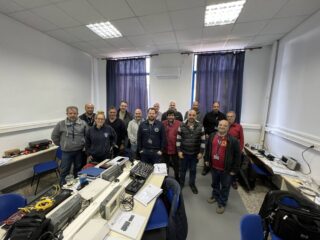
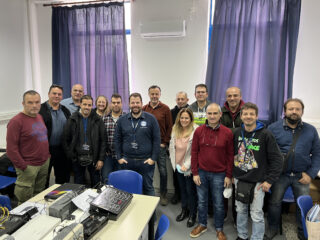
Overall, the participants expressed complete satisfaction with both the content of the training and the flexibility of the program, as well as with the trainers’ ability to effectively impart their knowledge.

